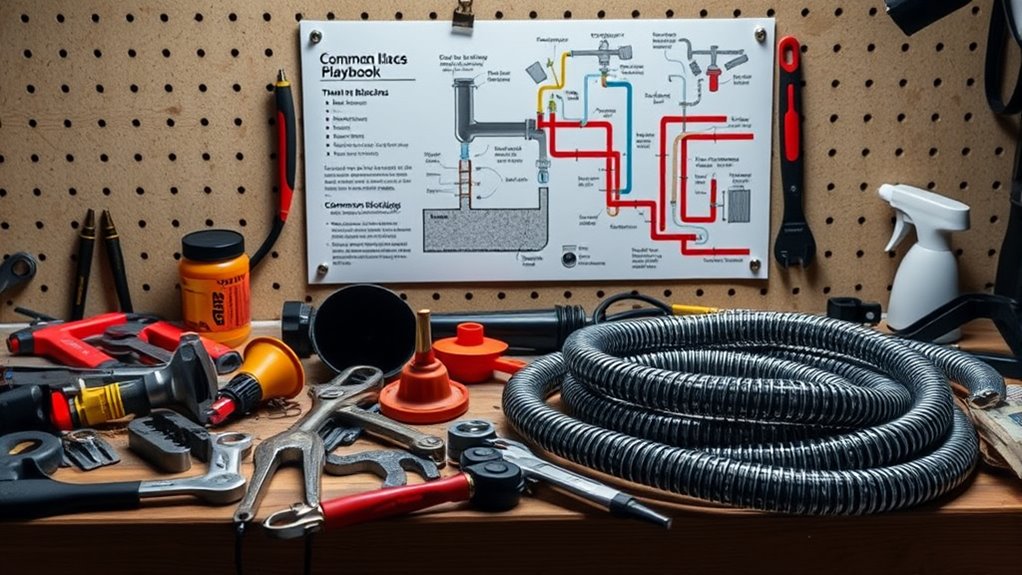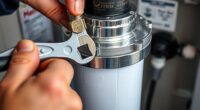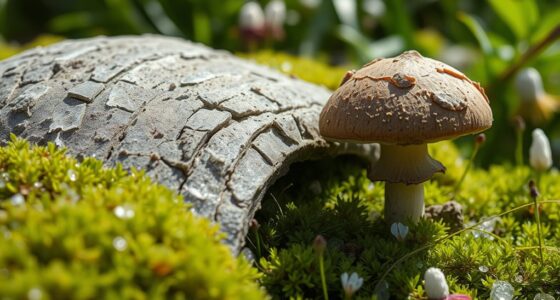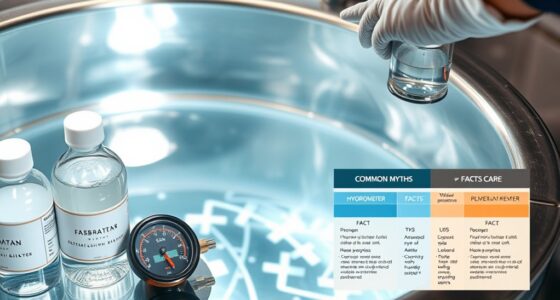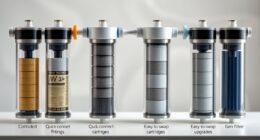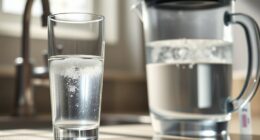Understanding drain line blockages involves recognizing common myths and facts. DIY methods like plungers can work for minor clogs but often fall short on stubborn or deep blockages. Chemical cleaners may seem quick but can damage pipes if misused and aren’t always effective. Eco-friendly solutions and proactive maintenance can prevent issues before they start. Keep exploring to uncover proven techniques and avoid costly mistakes with your drain system.
Key Takeaways
- DIY drain clearing methods have limitations and cannot always resolve stubborn or deep blockages effectively.
- Chemical drain cleaners are often ineffective and can damage pipes; safer, eco-friendly alternatives exist.
- No single technique guarantees success; professional tools and expertise are essential for complex or severe blockages.
- Regular maintenance, inspections, and drain screens are crucial to prevent blockages and prolong pipe health.
- Understanding the risks and benefits of various drain clearing methods ensures safe, cost-effective, long-term plumbing solutions.
Common Myths About Drain Clearing Techniques

Many people believe that DIY drain clearing methods are always effective, but this isn’t true. One common myth is that a plunger’s effectiveness is limited, but with proper technique, it can often dislodge minor clogs. However, relying solely on a plunger might not work for stubborn blockages or deep obstructions. Another misconception involves drain snake myths, where many think they’re always the best solution. While drain snakes can be powerful tools, improper use can damage pipes or push debris further down the line. It’s important to understand that no single method guarantees success every time. Knowing the limitations of these techniques helps you decide when to try DIY methods and when to call a professional for more complex issues. Additionally, understanding the horsepower of electric dirt bikes can help you appreciate the power behind some tools used in drain cleaning, such as electric augers, which require significant torque to clear tough blockages.
Debunking Misconceptions About Chemical Drain Cleaners

Chemical drain cleaners are often seen as quick fixes for clogs, but their effectiveness is frequently overstated. Many believe they’re the ultimate solution, but this isn’t always true. Instead, consider these facts:
- They can damage pipes over time, especially if used improperly.
- They often don’t fully clear stubborn blockages, requiring professional plumbing tips.
- Safer, biodegradable alternatives exist that are just as effective without harming your plumbing or the environment.
- Proper user consent management ensures you are aware of the potential risks and benefits associated with different drain cleaning methods.
Using chemical cleaners can lead to costly repairs, so it’s better to explore eco-friendly options. Professional plumbers recommend natural solutions like baking soda and vinegar or enzymatic cleaners. These biodegradable alternatives help maintain your pipes’ health and avoid unnecessary damage, saving you money in the long run.
Effective Strategies for Preventing and Addressing Blockages
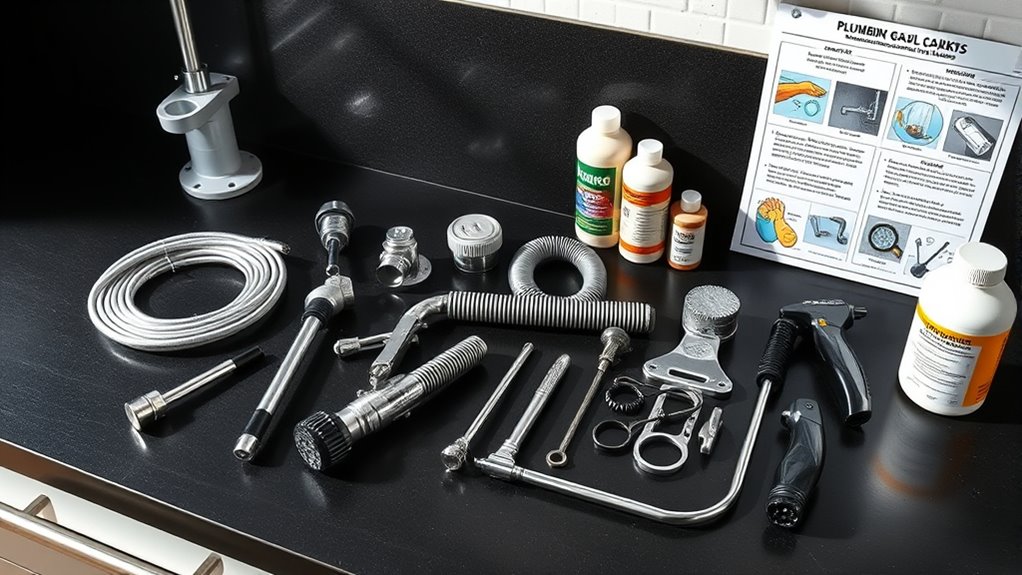
Preventing and addressing drain blockages requires proactive habits and timely action. Regular pipe maintenance is essential; schedule professional drain inspections to identify potential issues before they become serious. Clean your drains frequently by avoiding the buildup of grease, hair, and debris, which can cause blockages. Use drain screens to catch particles and prevent them from entering the pipes. If you notice slow draining or gurgling sounds, don’t ignore them—inspect your drains promptly to catch problems early. Address minor clogs with safe, household remedies or call a professional if needed. Consistent pipe maintenance and drain inspection help keep your plumbing clear, saving you from costly repairs and inconvenient backups. Staying vigilant ensures your drains stay free-flowing and healthy. Regularly checking for blockage signs can help prevent minor issues from escalating into major problems.
Frequently Asked Questions
How Do I Identify a Drain Blockage Early?
To identify a drain blockage early, you should pay attention to early warning signs during a plumbing inspection. Look for slow draining sinks, gurgling sounds, or foul odors coming from drains. These signs indicate potential issues before a complete blockage occurs. Regular inspections help catch problems early, allowing you to address minor issues before they escalate, saving you time and costly repairs later on.
Are There Eco-Friendly Options for Drain Cleaning?
Yes, there are eco-friendly solutions for drain cleaning. You can use biodegradable cleaners that break down naturally, reducing environmental impact. Baking soda and vinegar are popular, safe options that help clear minor clogs without harsh chemicals. Regularly pouring hot water down the drain also helps prevent buildup. These eco-friendly solutions are effective, safe for your pipes, and better for the planet, giving you a sustainable way to keep your drains clear.
What Tools Are Best for DIY Drain Clearing?
You should start with a plunger, focusing on proper plunger techniques to dislodge clogs effectively. If that doesn’t work, use a drain snake, ensuring you maintain it well to prevent damage and keep it clean. Regular drain snake maintenance involves lubrication and thorough cleaning after each use. These tools are your best options for DIY drain clearing, helping you handle blockages quickly and safely without calling a plumber.
When Should I Call a Professional Plumber?
Like a detective with a drain camera, you should call a professional plumber when DIY methods fail or if you notice persistent clogs, foul odors, or slow drainage. They’ll perform plumbing inspections to identify hidden issues and use specialized tools to diagnose problems accurately. If your efforts don’t clear the blockage or if you’re unsure about the cause, don’t hesitate to contact a pro to prevent further damage.
Can Regular Maintenance Prevent Major Blockages?
Regular maintenance can definitely help prevent major blockages. By scheduling routine clog prevention tasks like using enzyme-based cleaners and avoiding grease or hair buildup, you keep your pipes clear. Consistent maintenance reduces the risk of stubborn clogs forming, saving you from costly repairs. Make it a habit to inspect and clean drains periodically, ensuring your plumbing stays smooth and functional, and major issues stay at bay.
Conclusion
By now, you see that drain line blockages aren’t as mysterious as they seem. Don’t fall for myths that cloud your judgment—arm yourself with facts and proven strategies. Remember, prevention is your best weapon, and timely action can save you from costly repairs. Think of your drain as a trusted friend; treat it well, and it’ll serve you faithfully. So, stay vigilant and clear the way for smooth, worry-free plumbing—your pipes will thank you.
